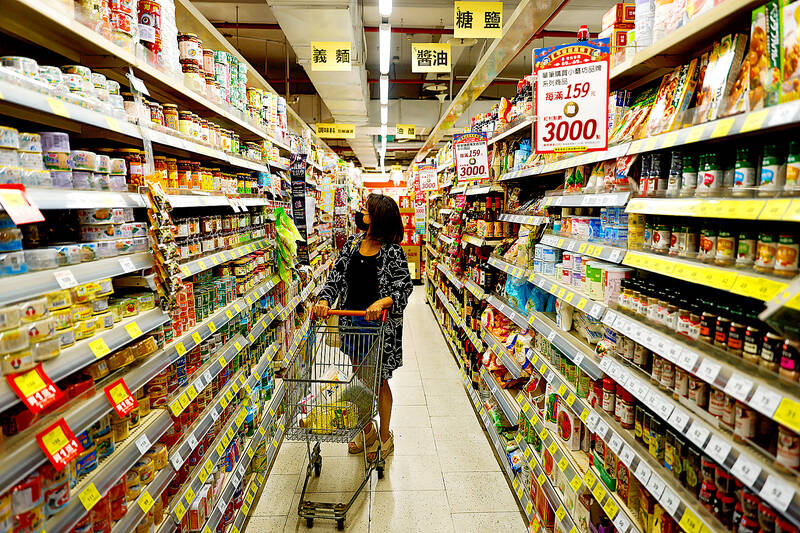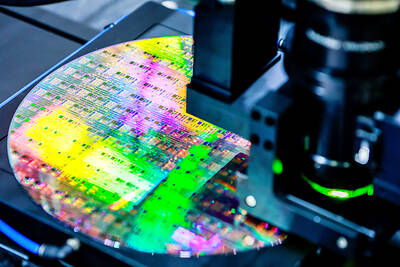Retail sales last month increased 0.4 percent year-on-year to NT$391.5 billion (U$12.91 billion), as consumers bought a range of goods at e-commerce sites, department stores, convenience stores and cosmetics outlets, but slowing vehicle sales and economic uncertainty pose a downside risk to spending momentum ahead.
Last month’s sales growth followed four straight months of spending declines, data released by the Ministry of Economic Affairs showed yesterday.
Sales increased 0.8 percent on a month-on-month basis.

Photo: Ritchie B. Tongo, EPA
The figure marked the highest level for August and met the ministry’s forecast, which projected retail sales to be between NT$380.7 billion and NT$392.4 billion, or between an annual decline of 2.4 percent and an increase of 0.6 percent.
Excluding sales of motor vehicles and parts, which fell 4.5 percent last month due to conservative sentiment in the market, retail sales last month rose 1.3 percent from a year earlier, the ministry said in a report.
The data showed steady consumer spending at supermarkets and hypermarkets, but fuel product outlets, as well as clothing and accessories retailers, posted continued sales declines.
In the first eight months of this year, cumulative retail sales totaled NT$3.15 trillion, down 0.7 percent compared with the same period last year, the report said.
Meanwhile, food and beverage sales last month increased more than expected, up 4.8 percent annually to NT$93.3 billion, the ministry said in the same report, adding that sales were up 7.8 percent from the previous month.
Last month’s sales were the highest figure for August and beat the ministry’s forecast of a range between NT$88.1 billion and NT$90.8 billion, or between an annual decrease of 1 percent and an annual increase of 2 percent.
It came as restaurant sales rose 4.1 percent and sales at beverage stores increased 8 percent, while catering service sales grew 7.3 percent, suggesting that consumers kept dining out and spent on some discretionary items during the summer vacation and festive gatherings.
Food and beverage sales in the first eight months rose 3.1 percent year-on-year to NT$711.2 billion, the report said.
For this month, the ministry projected that retail sales would decline 2.2 to 5.2 percent from a year earlier due to economic uncertainty and the seasonal weakness during Ghost Month, while food and beverage sales would show an annual decrease of 1 percent to an increase of 2 percent.

TECH TITAN: Pandemic-era demand for semiconductors turbocharged the nation’s GDP per capita to surpass South Korea’s, but it still remains half that of Singapore Taiwan is set to surpass South Korea this year in terms of wealth for the first time in more than two decades, marking a shift in Asia’s economic ranks made possible by the ascent of Taiwan Semiconductor Manufacturing Co (TSMC, 台積電). According to the latest forecasts released on Thursday by the central bank, Taiwan’s GDP is expected to expand 4.55 percent this year, a further upward revision from the 4.45 percent estimate made by the statistics bureau last month. The growth trajectory puts Taiwan on track to exceed South Korea’s GDP per capita — a key measure of living standards — a

Samsung Electronics Co shares jumped 4.47 percent yesterday after reports it has won approval from Nvidia Corp for the use of advanced high-bandwidth memory (HBM) chips, which marks a breakthrough for the South Korean technology leader. The stock closed at 83,500 won in Seoul, the highest since July 31 last year. Yesterday’s gain comes after local media, including the Korea Economic Daily, reported that Samsung’s 12-layer HBM3E product recently passed Nvidia’s qualification tests. That clears the components for use in the artificial intelligence (AI) accelerators essential to the training of AI models from ChatGPT to DeepSeek (深度求索), and finally allows Samsung

Taiwan has imposed restrictions on the export of chips to South Africa over national security concerns, taking the unusual step of using its dominance of chip markets to pressure a country that is closely allied with China. Taiwan requires preapproval for the bulk of chips sold to the African nation, the International Trade Administration said in a statement. The decision emerged after Pretoria tried to downgrade Taipei’s representative office and force its move to Johannesburg from Pretoria, the Ministry of Foreign Affairs has said. The move reflects Taiwan’s economic clout and a growing frustration with getting sidelined by Beijing in the diplomatic community. Taiwan

READY TO HELP: Should TSMC require assistance, the government would fully cooperate in helping to speed up the establishment of the Chiayi plant, an official said Taiwan Semiconductor Manufacturing Co (TSMC, 台積電) yesterday said its investment plans in Taiwan are “unchanged” amid speculation that the chipmaker might have suspended construction work on its second chip packaging plant in Chiayi County and plans to move equipment arranged for the plant to the US. The Chinese-language Economic Daily News reported earlier yesterday that TSMC had halted the construction of the chip packaging plant, which was scheduled to be completed next year and begin mass production in 2028. TSMC did not directly address whether construction of the plant had halted, but said its investment plans in Taiwan remain “unchanged.” The chipmaker started